#but I love the way David Tennant said
Text
Good Omens (S2)
I have conflicted feelings towards this season...
I adore every single scene with Aziraphale and Crowley. I can watch Michael Sheen and David Tennant acting for a millennium. There were so many details to focus on and all the microexpression and the delivery of lines were so on point. I love Gabriel and Muriel as well ~~ little kids ~~
On the other hand, the story itself didn't appeal to me much. To me, it's like a combination of several different fanfictions. The stories happen in the same world and a (theoretically) continuous timeline with the canon (aka season 1), but not quite convey the same picture or with the same intention. I enjoy each story separately, but I felt that my understanding of the two characters' arc and their relationship progress kept flipping around. I'm confused and I don't know how to think of them.
Another thing I don't like is the overwhelming romantic tone. It's my personal preference. I generally don't like heavy romantic vibe unless it's a romantic story from the start. Yes, I know there were quite a bit romantic coded moments in season 1, but it was still more about the end of the world (or the good and evil I suppose). I like their dynamic in season 1. It's light and subtle but we still know clear as day how deep their love goes and how their relationship progressed through time. I like their relationship wasn't clearly put into words. They are just so familiar and comfortable with each other and there's really no need to define them by human words, which has been changing all the time anyway. There's a beauty in subtlety.
(S1)
#completely unrelated#but I love the way David Tennant said#“ Let there be light”#it's simple and casual yet full of power and authority#my favorite line for Aziraphale is#“ Rescuing me makes him so happy”#he knew what he was doing bad angel lol#good omens#ineffable husbands#other review
1 note
·
View note
Text
no but the thing is. they KISSED. on screen. it was a real scene, not deleted, not removed from a script, it HAPPENED in front of the world's eyes. and AND the actors are normal about it and the whole cast and crew is normal about it and it's not vague and it's IMPORTANT. no matter the rest of it and what came after it, it happened!!
#and i AM gonna say this in the tags to avoid too much controversy but#STOP COMPARING GOOD OMENS TO SUPERNATURAL THERE IS ABSOLUTELY NO POINT IN DOING THAT. WHY#why do you need to treat good omens as inferior to a show that was so fucked up. i love certain aspects of spn but#i would never in my life pit those shows against each other because they are nowhere near the same in ANY way#and guess what. i feel more fulfilled with the (CANON might i remind you) arc between crowley and aziraphale than i ever did with destiel#there. i said it and i WILL happily die on that hill alone if i had to#I LOVE WHEN ROMANTIC FEELINGS BETWEEN CHARACTERS ARE ACKNOWLEDGED AMD THEY DID THAT FOR FUCKING REAL#good omens spoilers#gomens#good omens 2#good omens#aziracrow#ineffable husbands#david tennant#michael sheen
8K notes
·
View notes
Text
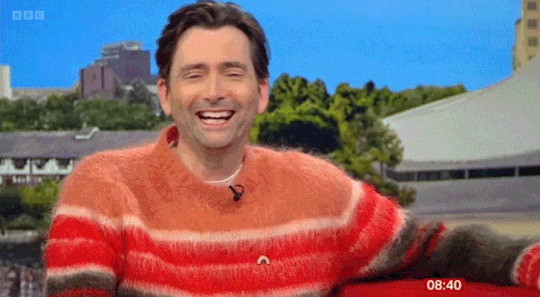

David on BBC breakfast today, 15.3.24
#what an absolute charmer#that twinkle in his eyes when he laughs#love the way he pulls up his sleeves#the interviewer had accidentally rolled her r’s#her colleague asked her why she did it like that#and david asked her if it was a scottish accent#then she said she was embarrassed#and he rolled his sleeves up#almost as if to sympathise with her embarrassment#he’s so sweet#i love him your honor#david tennant#bbc breakfast#comic relief
321 notes
·
View notes
Text
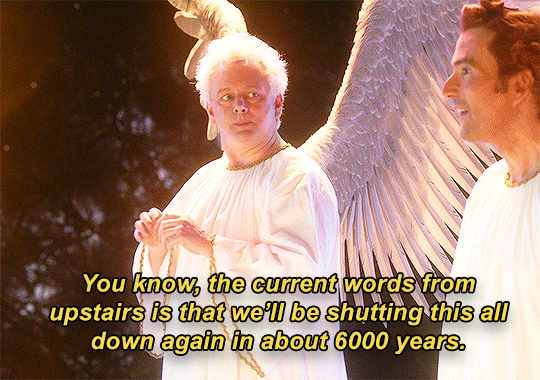
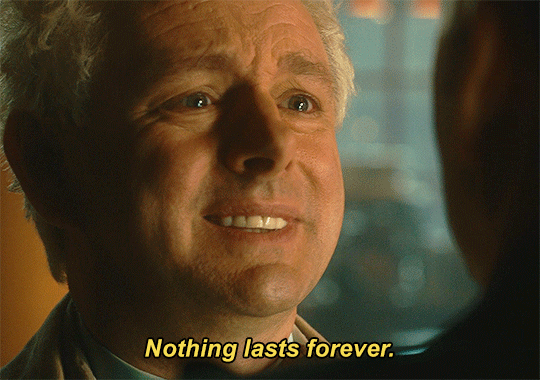


“Everything created has a beginning, Destiny of the Endless... as everything created has an end.”
— Neil Gaiman
(it hurts me physically to see the disappointment clouded Crowley’s face every time he realised things he loves might as well cease to exist eventually)
#good omens#good omens season 2#good omens 2#crowley x aziraphale#goodomensedit#david tennant#michael sheen#crowley#aziraphale#ineffable husbands#go2#gos2#mgif#blueskyandpudding#the heartbroken look on Crowley's face everytime someone said things he loved will be gone one way or another as nothing lasts#i am crying
597 notes
·
View notes
Text
i love david tennant to death but i'm JUST SAYING that nine could've easily gotten as many bitches in s1. just saying.
#this is not to say that the doctor has any game. any ''''rizz'''. no no. they do not.#they have negative rizz.#however i mean. well. have you SEEN christopher eccleston. have you see nine. like. ahem. hiiiiii.#yes yes david tennant is pretty yes we all can see him but COME ONNNNNN#bluebird.txt#doctor who#i'm just sayinnnnnnnnnnng#'im trying to resonate concrete' he's so lame i love him i need him.#i am not a sex haver or even a sex-want-to-haver#but that being said SOMEONE should definitely destroy nine sexually speaking. just sayinggggghhhhhgggncvnvkvicivifov.#n e ways i'm gonna go back to being normal now ahaha
46 notes
·
View notes
Text
the crush is crushing right now
#crushing in a bad way#i actually hate the feeling of having a crush it’s the worst thing ever#like not to be juvenile but the thought of liking a guy this much is kind of nauseating#like he’s just a guy??#and he’s kind of annoying#when he’s not being adorable#i saw him yesterday bc we had teaching together the whole day#but we didn’t talk much except on the tube on the way home#which was nice but also he was being a bit annoying#but I’m actually always so shocked at how much we have in common#we were talking about doctor who lol#and I think I asked his favourite like plot line across the whole show#but mainly about david tennants doctor#and he said the master plot line#which was also my favourite bc when I first watched it when I was younger I just loved that whole plot#and he said he liked it bc there was a kind of sherlock and moriarty dynamic#and i was just like wow#i’m re reading sherlock holmes rn and yeah it’s just all very interesting how much we align sometimes#but I’m not kidding when i say he was being kind of annoying#but was I smiling the whole time? Yes#nadiya.txt#this was so so long sorry
2 notes
·
View notes
Text
I’m new to tumblr and I know that it is NOT the place to go with doctor who hot takes but I fear that I am already going to do it even though no one asked for my opinion. Literally what is going on with doctor who right now. I haven’t watched wild blue yonder yet so take this with a grain of salt but the pacing of the first special was SO weird and there were a lot of plotlines I didn’t really understand. It didn’t feel at all like russel t davies’ writing so tbh I’m inclined to blame disney.
#i already didn’t like the way david tennant came back#oop who said that#not me surely#doctor who#the queerness was also handled in a way i didn’t love#but the doctor being basically canonically nonbinary is cool
0 notes
Text
How Michael Met Neil
original direct link [MP3]
(Neil, if you see this, please feel free to grab the transcript and store on your site; I had no easy way of contacting you.)
DAVID TENNANT: Tell me about @neil-gaiman then, because he's in that category [previously: “such a profound effect on my life”] as well.
MICHAEL SHEEN: So this is what has brought us together.
DAVID: Yes.
MICHAEL: To the new love story for the 21st century.
DAVID: Exactly.
MICHAEL: So when I went to drama school, there was a guy called Gary Turner in my year. And within the first few weeks, we were doing something, having a drink or whatever. And he said to me, “Do you read comic books?”
And I said, “No.” I mean, this is … what … '88? '88, '89. So it was … now I know that it was a period of time that was a big change, transformation going through comic books. Rather than it being thought of as just superheroes and Batman and Superman, there was this whole new era of a generation of writers like Grant Morrison.
DAVID: The kids who'd grown up reading comic books were now making comic books
MICHAEL: Yeah, yeah, and starting to address different kinds of subjects through the comic book medium. So it wasn't about just superheroes, it was all kinds of stuff going on – really fascinating stuff. And I was totally unaware of this.
And so this guy Gary said to me, "Do you read them?" And I said, "No." And he went, "Right, okay, here's The Watchman [sic] by Alan Moore. Here's Swamp Thing. Here's Hellblazer. And here's Sandman.”
And Sandman was Neil Gaiman's big series that put his name on the map. And I read all those, and, just – I was blown away by all of them, but particularly the Sandman stories, because he was drawing on mythology, which was something I was really interested in, and fairy tales, folklore, and philosophy, and Shakespeare, and all kinds of stuff were being mixed up in this story. And I absolutely loved it.
So I became a big fan of Neil's, and started reading everything by him. And then fairly shortly after that, within six months to a year, Good Omens the book came out, which Neil wrote with Terry Pratchett. And so I got the book – because I was obviously a big fan of Neil's by this point – read it, loved it, then started reading Terry Pratchett’s stuff as well, because I didn't know his stuff before then – and then spent years and years and years just being a huge fan of both of them.
And then eventually when – I'd done films like the Underworld films and doing Twilight films. And I think it was one of the Twilight films, there was a lot of very snooty interviews that happened where people who considered themselves well above talking about things like Twilight were having to interview me … and, weirdly, coming at it from the attitude of 'clearly this is below you as well' … weirdly thinking I'm gonna go, 'Yeah, fucking Twilight.”
And I just used to go, "You know what? Some of the greatest writing of the last 50-100 years has happened in science fiction or fantasy." Philip K Dick is one of my favorite writers of all time. In fact, the production of Hamlet I did was mainly influenced by Philip K Dick. Ursula K. Le Guin and Asimov, and all these amazing people. And I talked about Neil as well. And so I went off on a bit of a rant in this interview.
Anyway, the interview came out about six months later, maybe. Knock on the door, open the door, delivery of a big box. That’s interesting. Open the box, there's a card at the top of the box. I open the card.
It says, From one fan to another, Neil Gaiman. And inside the box are first editions of Neil's stuff, and all kinds of interesting things by Neil. And he just sent this stuff.
DAVID: You'd never met him?
MICHAEL: Never met him. He'd read the interview, or someone had let him know about this interview where I'd sung his praises and stood up for him and the people who work within that sort of genre as being like …
And he just got in touch. We met up for the first time when he came to – I was in Los Angeles at the time, and he came to LA. And he said, "I'll take you for a meal."
I said, “All right.”
He said, "Do you want to go somewhere posh, or somewhere interesting?”
I said, "Let's go somewhere interesting."
He said, "Right, I'm going to take you to this restaurant called The Hump." And it's at Santa Monica Airport. And it's a sushi restaurant.
I was like, “Right, okay.” So I had a Mini at the time. And we get in my Mini and we drive off to Santa Monica Airport. And this restaurant was right on the tarmac, like, you could sit in the restaurant (there's nobody else there when we got there, we got there quite early) and you're watching the planes landing on Santa Monica Airport. It's extraordinary.
And the chef comes out and Neil says, "Just bring us whatever you want. Chef's choice."
So, I'd never really eaten sushi before. So we sit there; we had this incredible meal where they keep bringing these dishes out and they say, “This is [blah, blah, blah]. Just use a little bit of soy sauce or whatever.” You know, “This is eel. This is [blah].”
And then there was this one dish where they brought out and they didn't say what it was. It was like “mystery dish”, we had it ... delicious. Anyway, a few more people started coming into the restaurant as time went on.
And we're sort of getting near the end, and I said, "Neil, I can't eat anymore. I'm gonna have to stop now. This is great, but I can't eat–"
"Right, okay. We'll ask for the bill in a minute."
And then the door opens and some very official people come in. And it was the Feds. And the Feds came in, and we knew they were because they had jackets on that said they were part of the Federal Bureau of Whatever. And about six of them come in. Two of them go … one goes behind the counter, two go into the kitchen, one goes to the back. They've all got like guns on and stuff.
And me and Neil are like, "What on Earth is going on?"
And then eventually one guy goes, "Ladies and gentlemen, if you haven't ordered already, please leave. If you're still eating your meal, please finish up, pay your bill, leave."*
[* - delivered in a perfect American ‘serious law agent’ accent/impression]
And we were like, "Oh my God, are we poisoned? Is there some terrible thing that's happened?"
We'd finished, so we pay our bill. And then all the kitchen staff are brought out. And the head chef is there. The guy who's been bringing us this food. And he's in tears. And he says to Neil, "I'm so sorry." He apologizes to Neil. And we leave. We have no idea what happened.
DAVID: But you're assuming it's the mystery dish.
MICHAEL: Well, we're assuming that we can't be going to – we can't be – it can't be poisonous. You know what I mean? It can't be that there's terrible, terrible things.
So the next day was the Oscars, which is why Neil was in town. Because Coraline had been nominated for an Oscar. Best documentary that year was won by The Cove, which was by a team of people who had come across dolphins being killed, I think.
Turns out, what was happening at this restaurant was that they were having illegal endangered species flown in to the airport, and then being brought around the back of the restaurant into the kitchen.
We had eaten whale – endangered species whale. That was the mystery dish that they didn't say what it was.
And the team behind The Cove were behind this sting, and they took them down that night whilst we were there.
DAVID: That’s extraordinary.
MICHAEL: And we didn't find this out for months. So for months, me and Neil were like, "Have you worked anything out yet? Have you heard anything?"
"No, I haven't heard anything."
And then we heard that it was something to do with The Cove, and then we eventually found out that that restaurant, they were all arrested. The restaurant was shut down. And it was because of that. And we'd eaten whale that night.
DAVID: And that was your first meeting with Neil Gaiman.
MICHAEL: That was my first meeting. And also in the drive home that night from that restaurant, he said, and we were in my Mini, he said, "Have you found the secret compartment?"
I said, "What are you talking about?" It's such a Neil Gaiman thing to say.
DAVID: Isn't it?
MICHAEL: The secret compartment? Yeah. Each Mini has got a secret compartment. I said, "I had no idea." It's secret. And he pressed a little button and a thing opened up. And it was a secret compartment in my own car that Neil Gaiman showed me.
DAVID: Was there anything inside it?
MICHAEL: Yeah, there was a little man. And he jumped out and went, "Hello!" No, there was nothing in there. There was afterwards because I started putting...
DAVID: Sure. That's a very Neil Gaiman story. All of that is such a Neil Gaiman story.
MICHAEL: That's how it began. Yeah.
DAVID: And then he came to offer you the part in Good Omens.
MICHAEL: Yeah. Well, we became friends and we would whenever he was in town, we would meet up and yeah, and then eventually he started, he said, "You know, I'm working on an adaptation of Good Omens." And I can remember at one point Terry Gilliam was going to maybe make a film of it. And I remember being there with Neil and Terry when they were talking about it. And...
DAVID: Were you involved at that point?
MICHAEL: No, no, I wasn't involved. I just happened to have met up with Neil that day.
DAVID: Right.
MICHAEL: And then Terry Gilliam came along and they were chatting, that was the day they were talking about that or whatever.
And then eventually he sent me one of the scripts for an early draft of like the first episode of Good Omens. And he said – and we started talking about me being involved in it, doing it – he said, “Would you be interested?” I was like, "Yeah, of course." I went, "Oh my God." And he said, "Well, I'll send you the scripts when they come," and I would read them, and we'd talk about them a little bit. And so I was involved.
But it was always at that point with the idea, because he'd always said about playing Crowley in it. And so, as time went on, as I was reading the scripts, I was thinking, "I don't think I can play Crowley. I don't think I'm going to be able to do it." And I started to get a bit nervous because I thought, “I don't want to tell Neil that I don't think I can do this.” But I just felt like I don't think I can play Crowley.
DAVID: Of course you can [play Crowley?].
MICHAEL: Well, I just on a sort of, on a gut level, sometimes you have it on a gut level.
DAVID: Sure, sure.
MICHAEL: I can do this.
DAVID: Yeah.
MICHAEL: Or I can't do this. And I just thought, “You know what, this is not the part for me. The other part is better for me, I think. I think I can do that, I don't think I could do that.”
But I was scared to tell Neil because I thought, "Well, he wants me to play Crowley" – and then it turned out he had been feeling the same way as well. And he hadn't wanted to mention it to me, but he was like, "I think Michael should really play Aziraphale."
And neither of us would bring it up. And then eventually we did. And it was one of those things where you go, "Oh, thank God you said that. I feel exactly the same way." And then I think within a fairly short space of time, he said, “I think we've got … David Tennant … for Crowley.” And we both got very excited about that.
And then all these extraordinary people started to join in. And then, and then off we went.
DAVID: That's the other thing about Neil, he collects people, doesn't he? So he'll just go, “Oh, yeah, I've phoned up Frances McDormand, she's up for it.” Yeah. You're, what?
MICHAEL: “I emailed Jon Hamm.”
DAVID: Yeah.
MICHAEL: And yeah, and you realize how beloved he is and how beloved his work is. And I think we would both recognise that Good Omens is one of the most beloved of all of Neil's stuff.
DAVID: Yes.
MICHAEL: And had never been turned into anything.
DAVID: Yeah.
MICHAEL: And so the kind of responsibility of that, I mean, for me, for someone who has been a fan of him and a fan of the book for so long, I can empathize with all the fans out there who are like, “Oh, they better not fuck this up.”
DAVID: Yes.
MICHAEL: “And this had better be good.” And I have that part of me. But then, of course, the other part of me is like, “But I'm the one who might be fucking it up.”
DAVID: Yeah.
MICHAEL: So I feel that responsibility as well.
DAVID: But we have Neil on site.
MICHAEL: Yes. Well, Neil being the showrunner …
DAVID: Yeah. I think it takes the curse off.
MICHAEL: … I think it made a massive difference, didn't it? Yeah. You feel like you're in safe hands.
DAVID: Well, we think. Not that the world has seen it yet.
MICHAEL (grimly): No, I know.
DAVID: But it was a -- it's been a -- it's been a joy to work with you on it. I can't wait for the world to see it.
MICHAEL: Oh my God. Oh, well, I mean, it's the only, I've done a few things where there are two people, it's a bit of a double act, like Frost-Nixon and The Queen, I suppose, in some ways. But, and I've done it, Amadeus or whatever.
This is the only thing I've done where I really don't think of it as “my character” or “my performance as that character”. I think of it totally as us.
DAVID: Yeah.
MICHAEL: The two of us.
DAVID: Yes.
MICHAEL: Like they, what I do is defined by what you do.
DAVID: Yeah.
MICHAEL: And that was such a joy to have that experience. And it made it so much easier in a way as well, I found, because you don't feel like you're on your own in it. Like it's totally us together doing this and the two characters totally complement each other. And the experience of doing it was just a real joy.
DAVID: Yeah. Well, I hope the world is as excited to see it as we are to talk about it, frankly.
MICHAEL: You know, there's, having talked about T.S. Eliot earlier, there's another bit from The Wasteland where there's a line which goes, These fragments I have shored against my ruin.
And this is how I think about life now. There is so much in life, no matter what your circumstances, no matter what, where you've got, what you've done, how much money you got, all that. Life's hard. I mean, you can, it can take you down at any point.
You have to find this stuff. You have to like find things that will, these fragments that you hold to yourself, they become like a liferaft, and especially as time goes on, I think, as I've got older, I've realized it is a thin line between surviving this life and going under.
And the things that keep you afloat are these fragments, these things that are meaningful to you and what's meaningful to you will be not-meaningful to someone else, you know. But whatever it is that matters to you, it doesn't matter what it was you were into when you were a teenager, a kid, it doesn't matter what it is. Go and find them, and find some way to hold them close to you.
Make it, go and get it. Because those are the things that keep you afloat. They really are. Like doing that with him or whatever it is, these are the fragments that have shored against my ruin. Absolutely.
DAVID: That's lovely. Michael, thank you so much.
MICHAEL: Thank you.
DAVID: For talking today and for being here.
MICHAEL: Oh, it's a pleasure. Thank you.
#neil gaiman#michael sheen#david tennant does a podcast with...#good omens#aziraphale#crowley#sushi#whale#the cove#oscars 2010#coraline#mini secret compartments#howneilmetmichael#howmichaelmetneil
5K notes
·
View notes
Note
Hi, Neil! You've mentioned that Brian May was initially reluctant to give you permission to use Queen's music in the miniseries (because of competition with the Bohemian Rhapsody film, I think?) but I don't remember you ever telling us why he finally relented. Unless it involves a secret phrase not unlike why the sheep finally obeyed Babe the pig, how did you get him to change his mind?
He wouldn't let us use Queen when we did the BBC Radio 4 adaptation. He was concerned that people might think that Queen was being made fun of, or that Queen was being seen as something old-fashioned or something. For Good Omens the TV show I wrote him a letter, which said...
Dear Brian
Terry Pratchett and I had a private joke, back in the 80s, that any cassette in your car would eventually turn into Queen's Greatest Hits. We put the joke into our cowritten novel GOOD OMENS, and wove a certain amount of Queen magic through the book. Done because, pretty obviously, we love Queen. The book went on to sell enormous numbers over the years, and whenever two Good Omens fans got together, they would talk about Queen.
I know that when Dirk Maggs approached you when he did the Radio 4 adaptation of GOOD OMENS, you were wary about getting involved, due to concerns about, well cassettes, and the possibility of it positioning Queen in people's minds as something old fashioned or silly.
Which, I thought, when Dirk told me about it, was fair enough.
I've now spent the better part of the last four years writing scripts for, and shooting, a TV adaptation of GOOD OMENS. It stars Michael Sheen, David Tennant, Miranda Richardson, Adria Arjana, Michael McKean, Derek Jacobi, Jon Hamm, Nick Offerman, and lots of other amazing people, and it will be narrated by Frances McDormand. It is directed by Emmy-award-winning Douglas Mackinnon.
Douglas loves Queen. I love Queen. David Arnold loves Queen.
And the millions upon millions of Good Omens fans around the world love Queen too. So we have put various moments in there just for them (including a brass band playing "Lazing on a Sunday Afternoon"). We want Queen music to comment on the action.
The show will come out from Amazon, and then from the BBC, next year. This year we are in post-production.
We'd love to show you some of what we've got. We'd love to pick your brains and to get your take on what we're doing. To find out if there's a way we can include you, or just brief you on what we've planned so far.
And Brian cheerfully apologised for having said no before, and said yes.
(Queen didn't want us to use the song Bohemian Rhapsody initially, because of concerns about the movie, but after a while they were happy even with that.)
5K notes
·
View notes
Text
Defining Ineffable Love (or, Aziracrow Learn the Rules of Romance)
(In response to this ask about ineffables and asexuality)
One of the major threads this season was Aziraphale and Crowley asking themselves what exactly is their relationship. Not what it is in terms of how much they love each other. (That's a given.) But what it is in terms of the human implications of their love.
Crowley and Aziraphale definitely come at the relationship with different perspectives, in terms of what they’re willing to admit to the relationship being. I don’t think we can entirely interpret it in human terms.
–David Tennant (source)
For 6000 years, they’ve never put a name on their relationship. They didn’t, because they’re inhuman, genderless, sexless beings and they didn’t grow up (as it were) with labels. And even when they did learn them, they couldn’t say it was love, because admitting that was a death sentence.
All of Aziraphale’s heart eyes and pining could live comfortably in his mind if he never admitted what that said about him as an angel (trauma compartmentalization). Crowley tries desperately to be cruel and nasty to add white noise around the blatant reality of his constant loyalty to Aziraphale. If you don’t put a word to it, it’s not real and they can’t punish you.
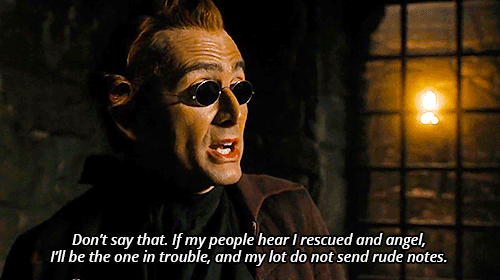
After the Not-pocalypse, for all rights and purposes, Aziraphale and Crowley chose humanity as their identity. We see Aziraphale “playing house” in various human roles (as a landlord, a private eye, a magician).
We even see Crowley intentionally taking on human behavior to handle emotional issues: “Just breathe, that’s what humans do.” They’re slowly and intentionally enculturating themselves into the world they want to belong––earth.
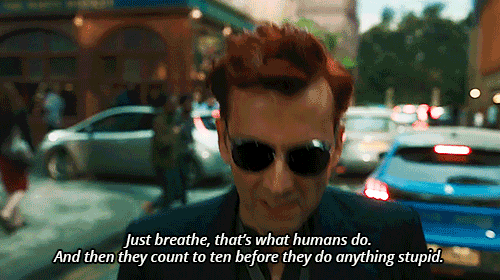
Yet it’s setting up Maggie and Nina that makes Aziraphale and Crowley start thinking about their relationship as a human construct.
Because fundamentally, Aziraphale and Crowley are not human. Like Neil Gaiman tells us constantly, they can’t be defined in human terms when it comes to gender and sexuality. They can shift and move through each and any of those markers at will, purely for the pleasure of the thing: “angels are sexless unless they really want to make an effort.”
IMO that makes them originally asexual, in the sense they were created without the need for sex. And it makes them fundamentally transgender and genderfluid, because while on earth, their sexless, eldritch spiritual bodies take on human, gendered forms and clothing. What gender (and sexuality) they identify with while on earth varies through the eras. Crowley definitely has a fluid gender identity, while Aziraphale appears to have settled on gay man (aka THE southern pansy) for his internal typology (although all of these identities are subject to change).
In the midst of all this fluidity, it’s no wonder Aziraphale and Crowley haven’t thought of their relationship in human terms before. There’s just so much different in them and their bodies than what they see in humanity. And there are no books and songs that show the kind of love they have, in the malleable, sexless bodies they have, with the background they have; it’s all ineffable.
Aziraphale and Crowley didn’t start out thinking they were in a romantic relationship. Whatever feelings they had were long repressed, redefined, and shuttled away. But they did love each other, without question. And it was that love which scared them, because it was bigger than anything they saw among humans, a love that was beautiful and blasphemous and unfathomable.
Kinda like what David Duchovny said about Mulder and Scully in The X-Files, “I don’t know if they’re in love. In a way, their relationship is deeper than that, because they cannot live without each other.”
Now take this profound, ineffable love and drop it into the little boxes and labels human culture has created for itself.
Full disclosure: I’m an asexual demiromantic person in a queerplatonic relationship, so I’ve done a fair bit of research on what romance is and how the rituals of romance are, in many ways, social inventions that vary from culture to culture. There’s love and then there’s romance, and they don’t always overlap. So my interpretation of Aziraphale and Crowley comes through this lens and the fact that Neil Gaiman has affirmed the validity of an ace-spec reading on our ineffables.
Which brings me back to my thesis: That only now are Aziraphale and Crowley thinking of themselves as a romantic couple, precisely because they are interfacing with humans and taking on their social rules.
I like this one asexual person’s description of their experience, which feels very much like our ineffables (from a very good article, I def recommend):
If there is a border between friendship and romance, then in my internal landscape, it goes right through a misty forest where no one has ever bothered to place signs....
Neither of us had intended to start anything even vaguely romantic, but the activities we did and the intense kind of immediate connection we had was coded as romantic in our culture.
That’s what Crowley realizes when Nina confronts him about his relationship to Aziraphale.
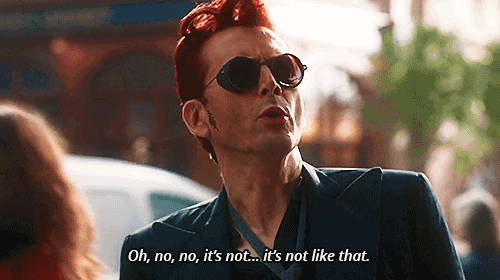
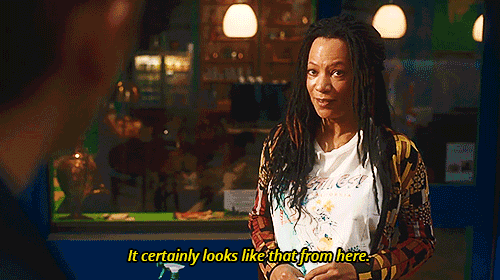
“It looks like that from here.” What Crowley and Aziraphale share is beyond definition, but Nina cannot imagine the anything beyond the human labels she was taught. The tragedy of an everlasting love is that it can only be conveyed properly to other humans if it is cast in such small human words––partner, boyfriend, husband.
Because when Crowley denied those human roles for Aziraphale, Nina slid down the path of thinking Aziraphale was just his “bit on the side,” because there were no labels left she could imagine for them. If you don’t put a word to it, it’s not real.
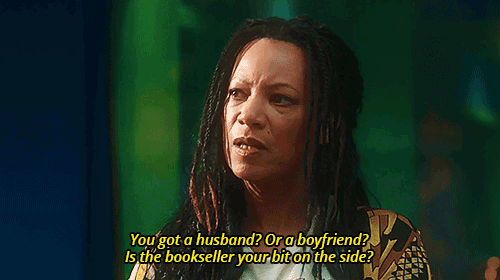
That’s the purpose of labels, to culturally validate a person's identity. Labels, of course, DO NOT create reality; people's experiences are always real, in all their varied ineffability. But labels allow a space for culture (ie other humans and political and legal society) to recognize formally your lived reality.
So Crowley started really thinking about him and Aziraphale, about the ineffable love between them and realized that in human terms, those would be the things he’d call Aziraphale, because those were the words that gave Aziraphale that place of importance in his life.
But with that realization comes all the human trappings and behavioral patterns around those words (the candlelit dinners, dramatic rescues, drinks at the Ritz, etc.) which Crowley had never thought of before, and yet… maybe romance is what he and Aziraphale have been doing all along.
That’s why this season centered so much around Aziraphale and Crowley using cultural artifacts (film and literature) to understand romance, because romance is so deeply socially-defined.
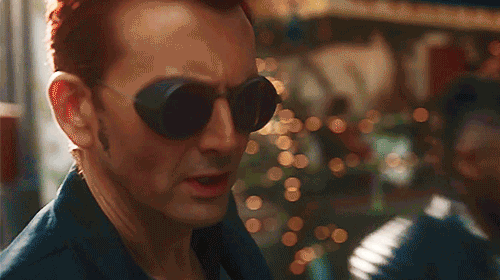
Aziraphale himself has been leaning hard into the romantic social cues (he’s more well-read in the cultural trappings of romance than Crowley is), especially post-Blitz. But when he watches Maggie and Nina dancing, he works up the courage to do something with Crowley that’s even more explicitly loaded as “traditionally romantic” than anything he’s done up to that point.
Because while risking their lives for each other and defying everything for each other is love in its purest form, dancing (specifically in Jane Austen’s world) is a public performance coded for potential marriage partners. It's an intimate ritual of the entire body. (And in British slang, dancing has been used as a euphemism for sex.)
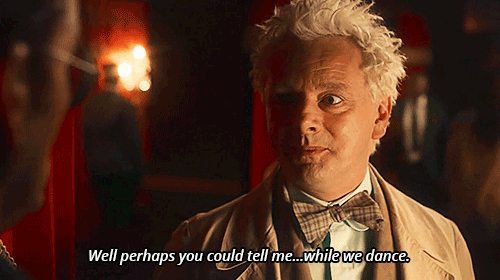
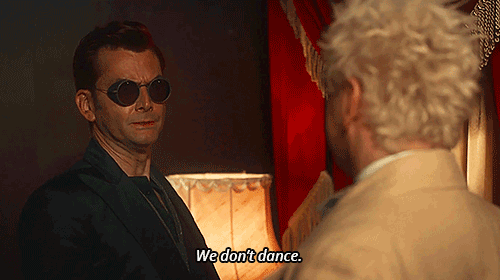
Crowley's "We don't dance" is really telling, because it shows Crowley’s awareness of the unknowable devotion between them vs the human roles Aziraphale is asking him to fill, specifically its physical aspects. Aziraphale is asking to make their relationship more public, more physically explicit, more coded as romantic in a setting specifically intended to couple individuals.
While Maggie and Nina inspired Aziraphale to progress their relationship into a publicly physical direction, Maggie and Nina inspired Crowley to think of the emotional implications of their human roles: the commitment, security, and monogamy of a husband, a partner, an us.
That’s what he decides after Maggie and Nina confront him in the end. “You never say what you’re really thinking.” He wants to codify his relationship so they each become responsible to one another. Aziraphale has always been his soulmate, the one he could always rely on. But he wants to place a word and a role to their love that will bring with it Aziraphale’s commitment and dedication to him.
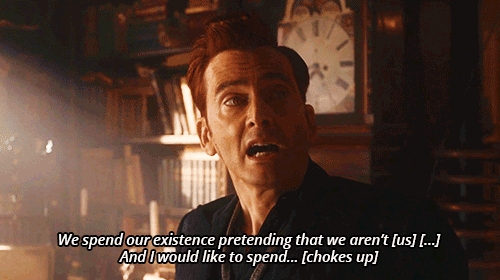
And that's another reason why Crowley kisses Aziraphale, because he knows Aziraphale was willing to make their relationship physical, and he wants that, too. To consummate this bond in the way humans do.
But Crowley doesn’t really know how to kiss; he’s not as worldly as he makes out to be. (It’s Aziraphale who owns the gun, and Crowley who’s never fired one.) He uses the kiss as a tool to get across to Aziraphale what he wants for them, in the physical language Aziraphale has been using, because "one fabulous kiss and we're good," right?
But it doesn’t work, because real life and real emotions don’t work like that; life and love don’t follow a script, despite the novels and plays and songs.
Aziraphale and Crowley spent this entire season trying to figure out what their relationship is and what they wanted out of it, trying to make sense of the unfathomable thing they share and the human implications of it, and not quite landing on the same page.
Part 2 of this Analysis, covering a correction in Crowley’s statement (“You don’t dance”) and the further implications of dancing/sex.
#please see the part 2 listed at the end for an analysis Crowley’s “you don’t dance#good omens#good omens 2#ineffable husbands#go s2 meta#go meta#good omens meta#queer#asexuality#asexual#aromantic#genderfluid#gos2spoilers#go s2#good omens 2 meta#ineffable romance#*mine#*mymeta
2K notes
·
View notes
Text
Highlights from Catherine Tate's Q&A Panel at Armageddon Expo 2024 (NZ) :
[I took notes best I could during the panel but some may be paraphrased]
Q: What's your favourite Doctor Who alien?
CT: The wonderful Ood!
Q: Who's your favourite Doctor? (Crowd gasps in anticipation)
CT: Well, I get asked this a lot, and obviously it's David (Tennant). I don't know what number he is, he keeps coming back. But definitely, David. Although, someone recently pointed out that I was technically the first ever female Doctor. So you know what? Me, I'm my favourite Doctor.
Q: What's your favourite episode you were in of Doctor Who?
CT:The Runaway Bride, because that's where it all began.
Q: What's a favourite memory of working with David Tennant on Doctor Who?
CT: The scene in 'Partners in Crime', the one with the Adipose, there's the scene where Donna and the Doctor see each other from across a room. But they're both behind glass and they have the whole mime scene with the windows. Well, I remember it was about 3am when we were filming that - - Russel really likes to film at night if the story is taking place at night - so it was 3am, and I said to the director 'Uh, right here it just says Donna Mimes' and he said 'Yeah do whatever'.
So that whole scene was ad-lib during shooting and David and I were so in sync with it, we did that first take and the director said cut and print!
Q: How emotional were you filming your final scene in Journey's End?
CT: So, we didn't always film in order. And I'm not really a sentimental person, but I will say I thought Donna's ending was absolutely perfect. When she meets the Doctor she was always yelling at the world, and she was so different than what she was by the end, she had so much growth with the Doctor and she changed so much in her time with him, but then, she forgets the him and all those memories. And that final scene, what really got me was how he says 'Donna, I'm off' and she's just, I think she's on the phone, and she just waves dismissively. She doesn't know him anymore. Russell, the way he ties things together, he's brilliant, that man.
Q: What was it like working with Bernard (Cribbins)?
CT: Oh, Bernard. God, I love him. He was so funny and talented. He always had stories and voices and sound effects. He loved making people laugh. But we had a gag where every single time I called him I'd say (Donna Voice) 'GRANDAD!'
He'd say, "Who is this?"
"It's Catherine."
"Catherine who?"
"Catherine Tate"
"Never heard of her."
We did this every time I called him and I loved it.
Q: Is there anything annoying about working with David Tennant?
CT: No, absolutely not. He's perfect. He's the best person to work with. I will say though, I was annoying him a lot. When we did the 60th Anniversary specials, our trailers looked exactly the same and I never knew where my trailer was. I'd walk into his all the time!
Sometimes I'd walk in and see his shoes in the trailer and instead of thinking 'Oops, wrong trailer', my brain went 'What's he gone and left his shoes in my trailer for?'
It got so bad, sometimes I'd walk up the stairs and from inside I'd hear 'NO.'
Q: Was it weird coming back to play Donna after all these years? Especially when it was along side David Tennant?
CT: It was a bit weird, more in the 'Oh I hope i still know how to do this' way than anything. But I did think it would be hilarious if David and I arrived on set and every take we just did completely wrong voices. Just thought it'd be hilarious for him to go (in an airy upper-crust British accent) 'Ohhhh, hellloooo. I'm the Doctor'
Q: If you could take any prop from set, what would you take?
CT: Ohhhh, I'd have very large pockets and see what I could fit. But mostly I think it'd be a sonic screwdriver. It's gotta be a sonic screwdriver, doesn't it? It's small and mobile... Easy to steal. Plus, it'd fetch a great price on Ebay!
Q: Best show you've ever worked on?
CT: The Office, they paid me tons of money.
Q: My mum loves David Tennant, is there something you can say to dissuade her?
CT: Hm, something to convince her he's not.... Oh, he doesn't believe in astrology! I'll say 'It's Mercury Retrograde' and he'll say 'NO, NO, NO I DON'T WANT TO HEAR IT'.
Other Highlights:
As soon as she came out, she saw the stage had no steps to the audience, so she stayed on mic and went the long way round to go into the audience and interview people, trying to find who had traveled the furthest to be here. She was sorely disappointed everyone was just from Aotearoa 🤣
Donna Lines She Performed:
"Oi Spaceman! You're not mating with me sunshine!" (Crowd went wild for that)
"Binary. Binary. Binary." (🥺)
She did some of her characters: Lauren Cooper mostly, but also wished someone Happy birthday as Nan
#Catherine Tate#Donna Noble#Doctor who#Lauren Cooper#Catherine Tate show#About me 2k24#The great cate tate adventure#dw 60th#David Tennant#tenth doctor#fourteenth doctor
451 notes
·
View notes
Text
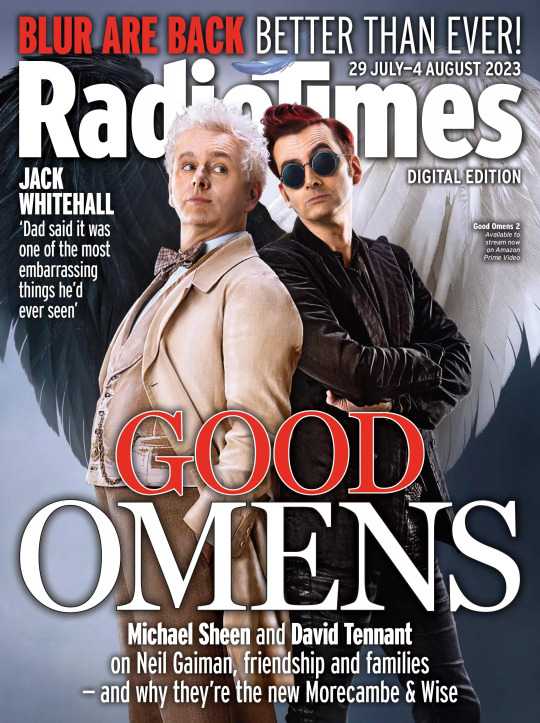
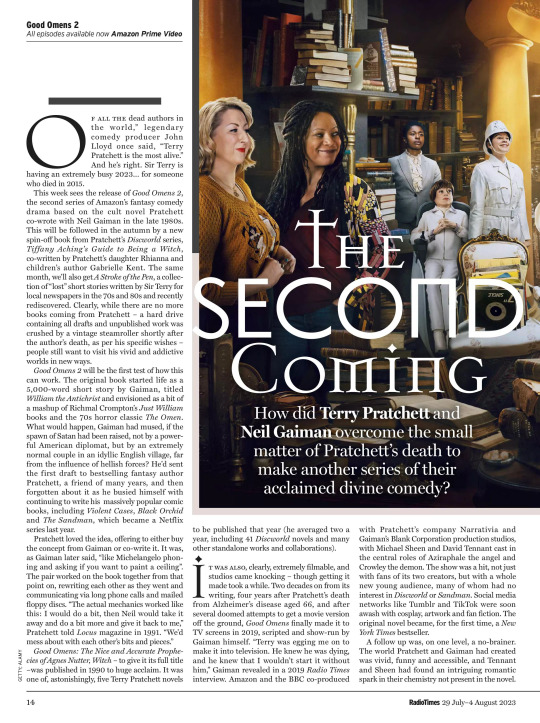
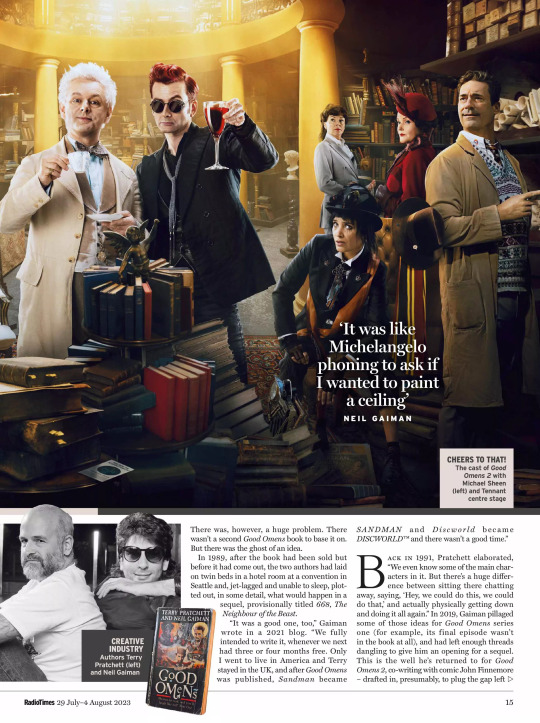
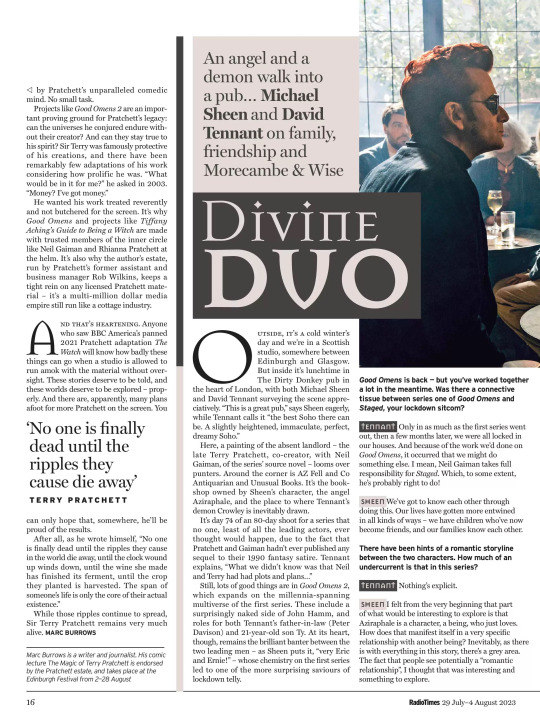
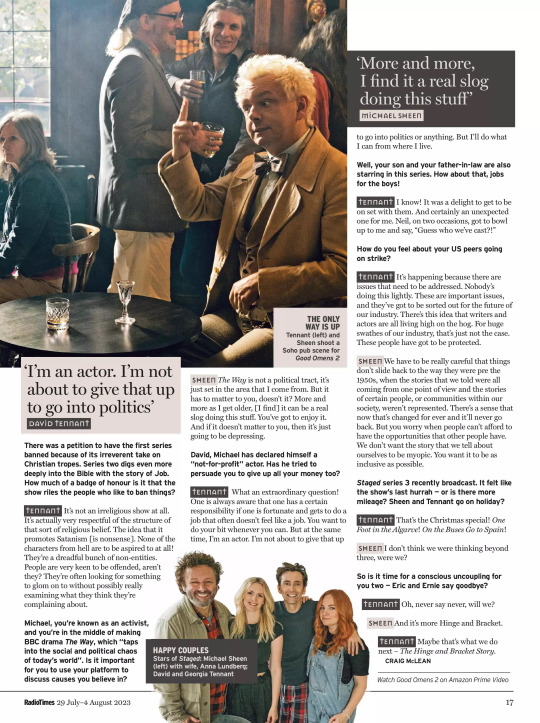
The Radio Times magazine from the 29 July-04 August 2023 :)
THE SECOND COMING
How did Terry Pratchett and Neil gaiman overcome the small matter of Pratchett's death to make another series of their acclaimed divine comedy?
For all the dead authors in the world,” legendary comedy producer John Lloyd once said, “Terry Pratchett is the most alive.” And he’s right. Sir Terry is having an extremely busy 2023… for someone who died in 2015.
This week sees the release of Good Omens 2, the second series of Amazon’s fantasy comedy drama based on the cult novel Pratchett co-wrote with Neil Gaiman in the late 1980s. This will be followed in the autumn by a new spin-off book from Pratchett’s Discworld series, Tiffany Aching’s Guide to Being a Witch, co-written by Pratchett’s daughter Rhianna and children’s author Gabrielle Kent. The same month, we’ll also get A Stroke of the Pen, a collection of “lost” short stories written by Sir Terry for local newspapers in the 70s and 80s and recently rediscovered. Clearly, while there are no more books coming from Pratchett – a hard drive containing all drafts and unpublished work was crushed by a vintage steamroller shortly after the author’s death, as per his specific wishes – people still want to visit his vivid and addictive worlds in new ways.
Good Omens 2 will be the first test of how this can work. The original book started life as a 5,000-word short story by Gaiman, titled William the Antichrist and envisioned as a bit of a mashup of Richmal Crompton’s Just William books and the 70s horror classic The Omen. What would happen, Gaiman had mused, if the spawn of Satan had been raised, not by a powerful American diplomat, but by an extremely normal couple in an idyllic English village, far from the influence of hellish forces? He’d sent the first draft to bestselling fantasy author Pratchett, a friend of many years, and then forgotten about it as he busied himself with continuing to write his massively popular comic books, including Violent Cases, Black Orchid and The Sandman, which became a Netflix series last year.
Pratchett loved the idea, offering to either buy the concept from Gaiman or co-write it. It was, as Gaiman later said, “like Michelangelo phoning and asking if you want to paint a ceiling” The pair worked on the book together from that point on, rewriting each other as they went and communicating via long phone calls and mailed floppy discs. “The actual mechanics worked like this: I would do a bit, then Neil would take it away and do a bit more and give it back to me,” Pratchett told Locus magazine in 1991. “We’d mess about with each other’s bits and pieces.”
Good Omens: The Nice and Accurate Prophecies of Agnes Nutter, Witch – to give it its full title –was published in 1990 to huge acclaim. It was one of, astonishingly, five Terry Pratchett novels to be published that year (he averaged two a year, including 41 Discworld novels and many other standalone works and collaborations).
It was also, clearly, extremely filmable, and studios came knocking — though getting it made took a while. rnvo decades on from its writing, four years after Pratchett's death from Alzheimer's disease aged 66, and after several doomed attempts to get a movie version off the ground, Good Omens finally made it to TV screens in 2019, scripted and show-run by Gaiman himself. "Terry was egging me on to make it into television. He knew he was dying, and he knew that I wouldn't start it without him," Gaiman revealed in a 2019 Radio Times interview. Amazon and the BBC co-produced with Pratchett's company Narrativia and Gaiman's Blank Corporation production studios, with Michael Sheen and David Tennant cast in the central roles of Aziraphale the angel and Crowley the demon. The show was a hit, not just with fans of its two creators, but with a whole new young audience, many of whom had no interest in Discworld or Sandman. Social media networks like Tumblr and TikTok were soon awash with cosplay, artwork and fan fiction. The original novel became, for the first time, a New York Times bestseller.
A follow up was, on one level, a no-brainer. The world Pratchett and Gaiman had created was vivid, funny and accessible, and Tennant and Sheen had found an intriguing romantic spark in their chemistry not present in the novel.
There was, however, a huge problem. There wasn't a second Good Omens book to base it on. But there was the ghost of an idea.
In 1989, after the book had been sold but before it had come out, the two authors had laid on fivin beds in a hotel room at a convention in Seattle and, jet-lagged and unable to sleep, plotted out, in some detail, what would happen in a sequel, provisionally titled 668, The II Neighbour of the Beast.
"It was a good one, too" Gaiman wrote in a 2021 blog. "We fully intended to write it, whenever we next had three or four months free. Only I went to live in America and Terry stayed in the UK, and after Good Omens was published, Sandman became SANDMAN and Discworld became DISCWORLD(TM) and there wasn't a good time."
Back in 1991, Pratchett elaborated, "We even know some of the main characters in it. But there's a huge difference between sitting there chatting away, saying, 'Hey, we could do this, we could do that,' and actually physically getting down and doing it all again." In 2019, Gaiman pillaged some of those ideas for Good Omens series one (for example, its final episode wasn't in the book at all), and had left enough threads dangling to give him an opening for a sequel. This is the well he's returned to for Good Omens 2, co-writing with comic John Finnemore - drafted in, presumably, to plug the gap left Pratchett's unparalleled comedic mind. No small task.
Projects like Good Omens 2 are an important proving ground for Pratchett's legacy: can the universes he conjured endure without their creator? And can they stay true to his spirit? Sir Terry was famously protective of his creations, and there have been remarkably few adaptations of his work considering how prolific he was. "What would be in it for me?" he asked in 2003. "Money? I've got money."
He wanted his work treated reverently and not butchered for the screen. It's why Good Omens and projects like Tiffany Aching's Guide to Being a Witch are made with trusted members of the inner circle like Neil Gaiman and Rhianna Pratchett at the helm. It's also why the author's estate, run by Pratchett's former assistant and business manager Rob Wilkins, keeps a tight rein on any licensed Pratchett material — it's a multi-million dollar media empire still run like a cottage industry.
And that's heartening. Anyone who saw BBC America's panned 2021 Pratchett adaptation The Watch will know how badly these things can go when a studio is allowed to run amok with the material without oversight. These stories deserve to be told, and these worlds deserve to be explored — properly. And there are, apparently, many plans afoot for more Pratchett on the screen. You can only hope that, somewhere, he'll be proud of the results.
After all, as he wrote himself, "No one is finally dead until the ripples they cause in the world die away, until the clock wound up winds down, until the wine she made has finished its ferment, until the crop they planted is harvested. The span of someone's life is only the core of their actual existence."
While those ripples continue to spread, Sir Terry Pratchett remains very much alive. MARC BURROWS
DIVINE DUO
An angel and a demon walk into a pub... Michael Sheen and David Tennant on family, friendship and Morecambe & Wise
Outside it's cold winter's day and we're in a Scottish studio, somewhere between Edinburgh and Glasgow. But inside it's lunchtime in The Dirty Donkey pub in the heart of London, with both Michael Sheen and David Tennant surveying the scene appreciatively. "This is a great pub," says Sheen eagerly, while Tennant calls it "the best Soho there can be. A slightly heightened, immaculate, perfect, dreamy Soho."
Here, a painting of the absent landlord — the late Terry Pratchett, co-creator, with Neil Gaiman, of the series' source novel — looms over punters. Around the corner is AZ Fell and Co Antiquarian and Unusual Books. It's the bookshop owned by Sheen's character, the angel Aziraphale, and the place to where Tennant's demon Crowley is inevitably drawn.
It's day 74 of an 80-day shoot for a series that no one, least of all the leading actors, ever thought would happen, due to the fact that Pratchett and Gaiman hadn't ever published any sequel to their 1990 fantasy satire. Tennant explains, "What we didn't know was that Neil and Terry had had plots and plans..."
Still, lots of good things are in Good Omens 2, which expands on the millennia-spanning multiverse of the first series. These include a surprisingly naked side of John Hamm, and roles for both Tennant's father-in-law (Peter Davison) and 21-year-old son Ty. At its heart, though, remains the brilliant banter between the two leading men — as Sheen puts it, "very Eric and Ernie !" — whose chemistry on the first series led to one of the more surprising saviours of lockdown telly.
Good Omens is back — but you've worked together a lot in the meantime. Was there a connective tissue between series one of Good Omens and Staged, your lockdown sitcom?
David: Only in as much as the first series went out, then a few months later, we were all locked in our houses. And because of the work we'd done on Good Omens, it occurred that we might do something else. I mean, Neil Gaiman takes full responsibility for Staged. Which, to some extent, he's probably right to do!
Michael: We've got to know each other through doing this. Our lives have gotten more entwined in all kinds of ways — we have children who've now become friends, and our families know each other.
There have been hints of a romantic storyline between the two characters. How much of an undercurrent is that in this series.
David: Nothing's explicit.
Michael: I felt from the very beginning that part of what would be interesting to explore is that Aziraphale is a character, a being, who just loves. How does that manifest itself in a very specific relationship with another being? Inevitably, as there is with everything in this story, there's a grey area. The fact that people see potentially a "romantic relationship", I thought that was interesting and something to explore.
There was a petition to have the first series banned because of its irreverent take on Christian tropes. Series two digs even more deeply into the Bible with the story of Job. How much of a badge of honour is it that the show riles the people who like to ban things?
David: It's not an irreligious show at all. It's actually very respectful of the structure of that sort of religious belief. The idea that it promotes Satanism [is nonsense]. None of the characters from hell are to be aspired to at all! They're a dreadful bunch of non-entities. People are very keen to be offended, aren't they? They're often looking for something to glom on to without possibly really examining what they think they're complaining about.
Michael, you're known as an activist, and you're in the middle of Making BBC drama The Way, which "taps into the social and political chaos of today's world". Is it important for you to use your plaform to discuss causes you believe in?
Michael: The Way is not a political tract, it's just set in the area that I come from. But it has to matter to you, doesn't it? More and more as I get older, [I find] it can be a real slog doing this stuff. You've got to enjoy it. And if it doesn't matter to you, then it's just going to be depressing.
David, Michael has declared himself a "not-for-profit" actor. Has he tried to persuade you to give up all your money too?
David: What an extraordinary question! One is always aware that one has a certain responsibility if one is fortunate and gets to do a job that often doesn't feel like a job. You want to do your bit whenever you can. But at the same time, I'm an actor. I'm not about to give that up to go into politics or anything. But I'll do what I can from where I live.
Well, your son and your father-in-law are also starring in this series. How about that, jobs for the boys!
David: I know! It was a delight to get to be on set with them. And certainly an unexpected one for me. Neil, on two occasions, got to bowl up to me and say, "Guess who we've cast?!"
How do you feel about your US peers going on strike?
David: It's happening because there are issues that need to be addressed. Nobody's doing this lightly. These are important issues, and they've got to be sorted out for the future of our industry. There's this idea that writers and actors are all living high on the hog. For huge swathes of our industry, that's just not the case. These people have got to be protected.
Michael: We have to be really careful that things don't slide back to the way they were pre the 1950s, when the stories that we told were all coming from one point of view and the stories of certain people, or communities within our society, weren't represented. There's a sense that now that's changed for ever and it'll never go back. But you worry when people can't afford to have the opportunities that other people have. We don't want the story that we tell about ourselves to be myopic. You want it to be as inclusive as possible
Staged series 3 recently broadcast. It felt like the show's last hurrah — or is there more mileage? Sheen and Tennant go on holiday?
David: That's the Christmas special! One Foot in the Algarve! On the Buses Go to Spain!
Michael: I don't think we were thinking beyond three, were we?
So is it time for a conscious uncoupling for you two — Eric and Ernie say goodbye?
David: Oh, never say never, will we?
Michael: And it's more Hinge and Bracket.
David: Maybe that's what we do next — The Hinge and Bracket Story. CRAIG McLEAN
#good omens#gos2#season 2#radio times#radio times 2023#interview#magazines#neil gaiman#terry pratchett#david tennant#michael sheen#david interview#michael interview#neil interview#terry interview#bts#fun fact#staged#the way#s2 interview#transcripts
895 notes
·
View notes
Text
pt XVI good omens season 2 (still not traumatic) episode 3 EDINBURGH
HELLO IT'S ME IT'S THE OFFICIAL GOOD OMENS MASCOT WHY DO I STILL KEEP INTRODUCING MYSELF IDK. If you don't know who I am, thank God and Satan for their mercy and flee. Also, the day after I post this, I'll be watching the last three episodes on livestream for the first time so. You know. I'm hyped on the energy of this being my last day not enveloped in tears. Take the summary:
Before the episode starts, someone asks why Crowley said in the last episode that Aziraphale couldn't fall because look at him, all angelic when Crowley looked the same as starmaker. I reply that "Crowley thinks he deserved it, he sees Azi as something beautiful and untouched while he probably sees himself as idk marked in some way so god kicked him down."
I am told that I am learning too fast to weaponise the narrative to induce angst. So then I say oh, I go too fast for you. Tears ensue.
The episode begins! Everyone shrieks about Edinburgh, David Tennant, how it is their favourite episode, and SCOTTISH CROWLEY.
We open with lesbians being gay, and then Muriel enters as Inspector Constable! They are very sweet and very determined to do their job right, and they are adopted by Crowley and Aziraphale just like Jim.
Crowley sits on Aziraphale's chair's arm. The maggots all swoon.
Fine, I also swooned.
Aziraphale gaslight-gatekeep-girlboss-mansplain-manipulate-manwhores his way into getting Crowley to give him the Bentley keys (BOUNDARIES. BOUNDARIES.).
WHAT PLENTY OF USE DO BOTH OF YOU GET OUT OF THE BOOKSHOP?
The really ineffable plan is whatever the fuck was happening in Aziraphale's brain when he somehow went from London to Edinburgh via Loch Ness (check the map) and then proceeded to disguise himself as a detective who pretends to be a journalist.
Crowley slays in sleeve garters and a cardigan keeping house in the bookshop meanwhile, does not sell books, instead cleans with Jimbriel and periodically yeets book stacks into corners when distracted.
Aziraphale reads his old diary entries about Crowley, a (6000+) 13 year old with a crush.
MINISODE MINISODE. They are in Edinburgh during the mid 1800s. Victorian outfits, check. Scottish Crowley, check. Capitalist Karen Aziraphale, che-wait what.
Huh. Well. There's a wee bit of body snatchin' going on, to sell to doctors for medical research because there aren't enough murderers, and to make enough money to survive.
Aziraphale channels his inner capitalist judgemental Karen and ruins that plan, come on Aziraphale you have religious trauma but you're better than this, and long story short, Wee Morag dies after Aziraphale realises his error, her friend Elspeth has to sell her corpse for pennies, and is about to commit suicide with laudanum. Azi, oh god. I'm glad you underwent character development at least.
NOW CROWLEY HERE SLAYS. I KNOW THIS IS AZIRAPHALE'S PERSPECTIVE AND IS BIASED. BUT WITH THIS POV, CROWLEY SLAYS.
He calmly educates Aziraphale about how his whole "the poor have more opportunities and you shouldn't give them money or they'll lose the virtue of poverty" is absolute bullshit, and he does this understanding Aziraphale's situation and not losing his temper.
The framing. The framing of the shot when they see Wee Morag and Elspeth sitting down on a step and explaining their situation. Aziraphale stands above, bustling with righteousness, and judges them. Crowley sits down. He sits down next to them, rather than taking the high ground. He meets them where they are and empathises. It is the fact that he is fallen and damned that makes him behave really divine and sorry I wrote a whole hymn on him have it I'll stop rambling just know I love him.
I think his amusement is a facade so hell won't think he's genuinely being good. I think he's morally grey and incredibly brave and kind.
When Elspeth is bouta kill herself with the laudanum, Crowley grabs it and drinks it himself, and grows tiny and then huge, absolutely high off his head. David Tennant takes the opportunity to travel Scotland from east to west in terms of accent variety.
He gives us the good message of NO DYIN'. NO MORE DYIN'. IT'S NOT ON. And then forces Aziraphale (who doesn't want to ruin her virtuous poverty) to give the girl all the guineas he has in his pocket, and tells her to go off and start a farm or something. BUT NOT JUST PRETENDY GOOD, BE PROPERLY GOOD.
He then gets pulled into hell. To be punished for this. Aziraphale is frightened and heartbroken for him, looking around desperately, and we find out that Crowley didn't meet him for a while after. And later he wanted holy water. To protect himself? He got punished by hell. For how long? The whole month in between the incident and the diary entry? There can't be anyone better at punishment and cruelty than hell.
Sorry I'm just screaming here.
Never mind fuck I started this summary really happy and bouncy and listening to a dance playlist. Dionysus by BTS and Italian pop is still playing and now I'm crying.
Is this the natural progression. Fuck I'm crying. Sorry guys something else happens with Aziraphale politely talking to a phone and Crowley smiling really beautifully while unsuccessfully trying to manipulate two lesbians into a relationship and something about a visit I don't care everyone's being morally dubious as usual and then lovely Scottish music outro I CAN'T FUCKING ELABORATE I'M SITTING HERE CRYING OVER CROWLEY.
right summary done, time to go sob, lmao i thought i wouldn't cry today over good omens HAHAHAHA still not traumatic eh HAHAHAHAHAHAHHAHAHAHAHAHAHA
#good omens mascot#good omens#good omens fandom#weirdly specific but ok#asmi#crowley#maggots#lgbtqia#aziraphale#neil gaiman#edinburgh#scotland minisode#victorian minisode#scottish crowley#david tennant#michael sheen#ineffable fandom#ineffable idiots#good ineffable omens#ineffable brainrot#good omens brainrot#CRYING OVER FICTIONAL CHARACTERS#AGAIN#YAY#anthony j crowley#starmaker#wee morag#elspeth and wee morag
423 notes
·
View notes
Text
Okay I lied that last rant wasn’t over
YET ANOTHER THING: I’ve seen a LOT of the blogs on here who ship David and Michael romantically talk about how David is “secretly” queer and how they’re going to be “safe spaces” for him when he’s ready to come out publicly.
Y’all. There is so, so much wrong with this for so many reasons. First of all, aside from a few rumors to the contrary that I’ve never seen any basis for, David has always been straight-presenting. He’s only dated women and is currently married to a woman, with whom he has several children. Yes, one of his kids is non-binary and he is an ardent supporter of them and an ally for the LGBTQ+ community as whole. This is GREAT. It shows he’s an engaged parent and a wonderful ally to the community. However, there is nothing pointing to the fact that that David is queer himself. Him wearing pride pins and wearing the “queer is here” sweatshirt is zero indication of his own sexuality. For all we know, he’s just supporting his kid. Also, all the “better halves” and “work wives” jokes made between the Tennant and Sheen families are clearly that: jokes. They’re all clearly in on the gag and think it’s funny, so they keep using it. There’s been no real life basis for them actually all being in love with each other and in some kind of swingers situation.
Second, labeling David as “queer” when he hasn’t specifically said he is himself is just plain wrong. There’s nothing “safe space” about that. Y’all just want to label him that because you want to fit him into your special little mold, so that your ship of Michael/David can set sail IRL, or so you can feel better represented. If it’s the latter, I encourage you to look at how David is an outspoken ally for the LBGTQ+ community. He’s made his voice known for years about how passionate he is about that community’s rights, and is a great high-profile ally to have. He doesn’t NEED to be queer himself if that’s not truly who he is.
Point is: Don’t label someone with a sexuality they’ve never publicly used themselves just because you want to see them that way.
If for some reason David wants to come out in the future, that’s great and I’ll support him wholeheartedly if it ever happens. But…there is NOTHING WRONG with letting him be in a happy, straight-presenting marriage with his wife. Both of them seem very happy, and both of them continue to be strong advocates for the LBGTQ+ community. Let them live their lives.
#I stg eventually I will stop having to make posts like these#david tennant#georgia tennant#michael sheen#david x michael#good omens#good omens fandom
401 notes
·
View notes
Text
My Two Cents On The “ Is David Tennant Queer” Drama
As some of you know, I spent a solid third of the past year working on a movie-length video essay about David Tennant. This video essay features an eight minute section titled “Gender, Vulnerability, and Why David Tennant Is A Queer Icon”, which does not speculate on David’s own sexuality, but discusses the queer coding and subversion of gender norms in plenty of his roles and his importance as an ally to the LGBT community. At the same time, I was also coming to terms with my own identity as nonbinary and bisexual, and it ended up playing a crucial role in me finally working up the courage to come out to my parents. Characters like Crowley and the Doctor, both in terms of how they present themselves and how and who they love, have been absolutely instrumental in me developing my queer identity, and my comments section was full of people who had had similar experiences, who’d realized they were trans, nonbinary, gay, etc thanks to David and his characters. And as a result, I won’t deny that if David himself were to be queer, it would mean a lot to me.
Do I think David is queer? It’s certainly possible. I see a lot of how I express my queerness in how david chooses to express himself, most prominently through his frequent queer coding of characters who don’t necessarily have to be played as such. This can especially be seen through his Shakespeare characters, such as Richard, Hamlet, and some would argue Benedick as well. When I was 15 I played Mercutio in Romeo and Juliet, who I chose to play as a closeted young gay man harboring an unrequited crush on Romeo. I think I saw this role subconsciously as an outlet for my own repressed queerness, both of gender and sexuality, as I had experienced an unrequited crush on my female best friend the previous year which I was still in denial about. I’ve described my gender identity as “a girl with a chaotic tortured gay man inside of her that needs to be let out every once in a while”, which has never been more true than with Mercutio- a character who I might add, I took a great deal of inspiration from David when playing! In terms of using roles as an outlet for one’s queerness, I could absolutelt see this being true with David, especially when it comes to Crowley, who seems to have had an impact on David’s style, behavior, etc in a rather similar way to how he’s impacted me. I don’t want to act like David wearing pink docs means he must be gay, I think people should be allowed to wear whatever they want regardless of sexuality, but taken in conjunction with so many other things about him, it does make one wonder, and the fact that a seemingly straight man has been so many people’s queer awakening is a bit puzzling to say the least. I won’t pretend that these “signs” (if you interpret them that way), haven’t been increasing somewhat in the past year, and if I got to share my own coming out journey with the man who inspired it, I would be absolutely thrilled. I also can’t specifically think of an instance where David has SAID he is straight, as opposed to Taylor swift, who has.
With all of that said, where I personally draw the line is when mere speculation crosses into interfering with the subject’s personal relationships and the sense that one is OWED something. I believe that what matters to David more than anything is being a husband and a father. I believe he adores Georgia and his children and would not do anything in the world that he believes would jeopardize his family. As happy as I would be for David if he were to come out (probably as bi) I realize that that would put so much unwanted attention on his marriage and family and I think that’s the last thing he wants. I don’t think it’s IMPOSSIBLE that he and Michael Sheen are having a passionate love affair behind everyone’s backs, but I absolutely don’t consider it my place to insist that they are, because as much as I may feel like I do, I don’t know these people! And besides, if David were cheating on Georgia, he really would not be the person I thought he was.
So many queer people see themselves in David and his characters, and that is beautiful. And I don’t think there’s anything inherently wrong with having theories that David might be queer himself. However, it must be acknowledged that these theories are THEORIES, and they should not be used to invalidate people’s real life relationships- after all, it’s totally possible to be bi/pan and also be in a loving and healthy heterosexual relationship like David and Georgia at least seem to be in! If David were in fact “one of us”, I would welcome him with the openest of open arms, but unless and until he himself decides to proclaim himself that way, I will not expect anything of him other than to be the incredible artist and person we know and love.
#David tennant#michael sheen#georgia tennant#queer#lgbt#bisexual#nonbinary#Rpf#Personal#meta#I try really hard not to discuss David’s sexuality online#But people are so divided on this topic and I wanted to voice my thoughts seeing as I stand somewhat in the middle#good omens#doctor who#Crowley#The tenth doctor#hamlet#the fourteenth doctor#much ado about nothing#benedick#richard ii
310 notes
·
View notes
Note
For the record, let us count DT mentioning Michael before GO, shall we?
1_ the one with DW producers where he joked about Michael being a potential Doctor.
2_ https://ibb.co/X8vyppv
Original interview where one of DW producers mentioned DT going to see Michael in his dressing room ;)) It wasn't the Frost\Nixon movie David went to see, it was the play version Michael did at Donmar in 2006.
3_https://site.douban.com/134465/widget/notes/5830282/note/185577686
This was in 2005, Read the second to last paragraph, David about consulting Michael about look back in anger
"I was talking to Michael Sheen who played the part and he said you get this extraordinary feeling half way through when you realise there’s nobody in the theatre that likes you.”
4_ the comic con interview where he mentioned he imagined seeing Michael in DW backstage sipping coffee and terrified that he's gonna replace him.
5_ www.tumblr.com/despisedtoolofsatan/734787102745804800/david-tennant-dallas-fan-days-2017-david-tennant?source=share
This was 2017 but it was before filming and even the first table read of GO1. DT bringing up Michael out of absolutely nowhere and saying he'd be a sensational doctor...
Ps: Btw anyone remember that one piece of written interview, where Michael said in the table read whilst reading the lines next to eachother, he went from "Oh you're really good" To "I think I'm in love with you" or something like that? Seems like a fever dream but I'm sure I read it somewhere...
I love when people serve me with evidence 💕
Publishing so everyone can read, I will dig in as soon as I’m free!
164 notes
·
View notes